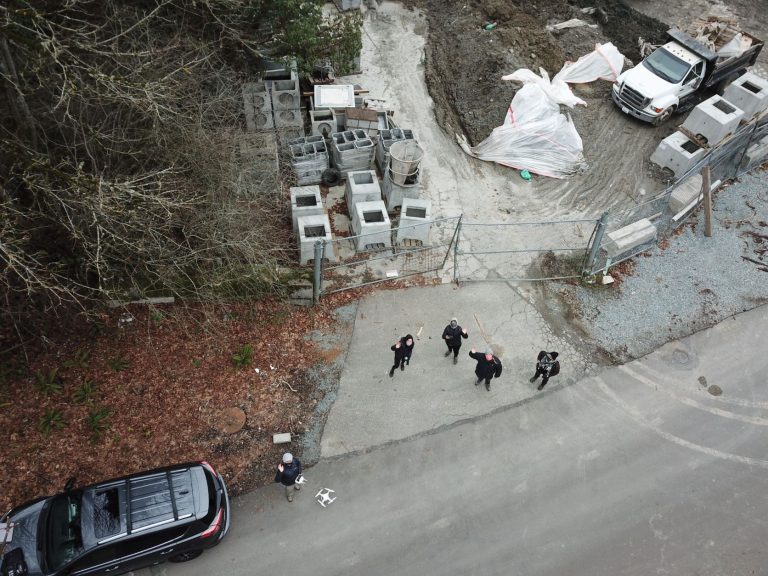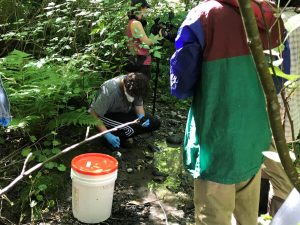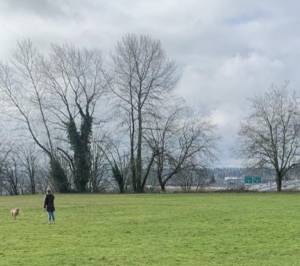Published on November 16, 2021

Over the past year, two teams of researchers from the University of Washington tackled a host of urban challenges in our region with the support of Urban@UW’s Research Spark Grants. In August 2020 grants of up to $20,000 were awarded to amplify collaborative research-to-practice with a focus on today’s urban issues. Two UW teams of researchers addressed civic engagement, parks and public spaces, and community-centered research.
The two teams faced significant challenges navigating place-based, community-centered research amidst the COVID-19 pandemic. These challenges offered new and compelling insights around civic and community engagement.
Co-creating an Adaptive Community-Science Network: Supporting Tribal and Grassroots Action through the Puget Creek Watershed Assessment
The research team led by Co-Principal Investigators Russell Beard (Tribal lead), Catherine De Almeida, Kristin Dew, Melanie Malone, and Cleo Wöelfle-Hazard, aimed to support existing efforts of the Duwamish Tribe and its NGO partners to address contaminant remediation around the Lower Duwamish River (LDR) and engage the local community in its processes. The Spark Grant project provided social and material infrastructure to the community that included monitorization of water, soils and organisms; mutual distribution of academic, Indigenous and local knowledge of the watershed; and a nurturing of community engagement around local river ecologies.
The team’s research provides a compelling framework for aligning research infrastructure and expertise with existing community work and priorities. The activation of community research connections was a central component of their work and a driver for the success of this team. The team organized several community-centered initiatives and events such as BioBlitz in May 2021, an opportunity for residents around Puget Creek to familiarize themselves with local plants and animals living in the watershed. Additionally, community science infrastructure included a community-driven water quality monitoring training and data collection expanded by Dew, and a youth and student-centered training in sample collection, led by Malone. In the latter, members of the Duwamish Valley Youth Corps and interns in the UW Doris Duke Conservation Scholars Program assisted in collecting samples of water, soil and sediment found throughout the superfund site.
In addition to these efforts, Wöelfle-Hazard along with graduate student assistants, oversaw three field surveys to detail the water quality and habitat characteristics of Puget Creek, and to screen for vertebrate and invertebrate life. The team also employed drone mapping and wildlife cameras to document changes in the basin regarding topography, erosion and wildlife activity. Throughout the duration of the grant, the team engaged UW-students in community driven projects including a quarter-long design studio and independent studies, both advised by De Almeida.

Led by the team of PI’s monitorization of water, soils and organisms included community, youth, and student participants. Photo credit: Beard et al.
How Dislocation Impacts Civic Engagement in Parks and Greenspaces
This project, led by Co-PI’s Rubén Casas and Anaid Yerena, originally sought to understand the impact of dislocation on civic engagement, with a focus on commuters. The research team hypothesized that long commutes correlate with decreased civic engagement as people have less time to encounter others in public space. With the challenges brought about by the pandemic and the dramatic changes in data around dislocation that emerged on the onset of stay-at-home orders, the project evolved to center the historical role of parks during pandemics and other instances of public crisis. Yerena and Casas synthesized these findings in a published piece titled, “A Place for Life: Striving Towards Accessible and Equitable Public Spaces for Times of Crisis and Beyond.”
These much-needed conversations around parks and greenspaces as social infrastructure manifested in several articles and presentations. In a Crosscut article written by Casas as a result of this research, he notes the capacity of parks as resources for communities in crisis, such as in the event of a natural disaster or pandemic. Simultaneously, he criticizes parks in the Puget Sound region for being inadequately capable of such expansive roles.
“One of the least surprising revelations of this pandemic is that the people who could most benefit from access to quality parks and open space simply don’t have it. Ill-conceived planning processes, regressive tax structures and legacies of development schemes that fail to see people of color and lower-wage earners as deserving of public goods are all part of the problem.” – Rubén Casas (Crosscut)
As a result of their combined research, the team advocates for public officials to prioritize better access to quality parks and green spaces.

Field observation at a park in Tacoma’s Central Neighborhood. Photo credit: Casas & Yerena
Yerena and Casas presented their work in multiple venues during 2020. Additionally, with a team of six undergraduate research assistants, they performed site observations of major parks throughout Tacoma through site visits and online surveys. Throughout the research process, Yerena and Casas have maintained communication with their community partners, Metro Parks and Washington State Parks. The impact of the pandemic has prompted continued research for Casas and Yerena in the future.